The Friendship Dynamic in Shaun of the Dead
Though the only one I've posted directly to Noise to Signal before is my explorative essay on an episode of Futurama, there were two others I kept stashed away on my own website. This one is my first, and one I'm still quite proud of.
Shaun of the Dead, Simon Pegg's and Edgar Wright's 2004 film about London being overrun by the reanimated dead, touts itself as "a romantic comedy with zombies," a statement that is just as misleading as it is true. By the end of the film we learn that what we've seen was neither just a romantic comedy, nor a zombie film; what Pegg and Wright have assembled for us is a parable: a parable about friendship.
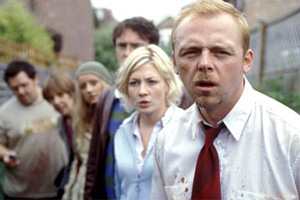 What separates Shaun of the Dead from common buddy-films is the lengths of exaggeration to which this particular parable is taken; it is exaggerated so successfully that the viewer will not even realize how contrived the basic elements of the plot actually are unless they really seek to dig. This is not meant to undermine what Pegg and Wright have accomplished--rather it's to commend them for having breathed new life (ahem) into what was, essentially, a dead plot structure: one friend helps (and relies upon) another to overcome a series of obstacles that have arisen, and by the end of the film the difficulties are vanquished and the two find themselves closer because of the experience.
What separates Shaun of the Dead from common buddy-films is the lengths of exaggeration to which this particular parable is taken; it is exaggerated so successfully that the viewer will not even realize how contrived the basic elements of the plot actually are unless they really seek to dig. This is not meant to undermine what Pegg and Wright have accomplished--rather it's to commend them for having breathed new life (ahem) into what was, essentially, a dead plot structure: one friend helps (and relies upon) another to overcome a series of obstacles that have arisen, and by the end of the film the difficulties are vanquished and the two find themselves closer because of the experience.
The reason this essentially empty plot functions so well in Shaun of the Dead is because of all the great little distractions to which the viewer is treated; never are we given time to question the plot, because we are always assured (by clever camera angles, by flash-montages, by morbid foreshadowing) that there is something else to the film, something below the surface.
Of course, this is all assuming that we are viewing the film from a purely intellectual standpoint, which, to be fair, Pegg and Wright could not rely on for the majority of its audience. So how to keep the rest of their viewers distracted from the emotional thrust of the film? Zombies.
Yes, the zombies. What better way to trick the viewer away from what is really happening between the characters than by keeping focus, at almost all times, on an external danger? The zombies, contrary to the traditional workings of a viewer's mind, are actually not the main plot of Shaun of the Dead; instead, they serve as a constant distraction from the main plot and also as a symptom of its exaggeration, but if the viewer is sharp enough, and determined to dig just a little deeper, it becomes clear that the real intention of the film is to explore the friendship dynamic.
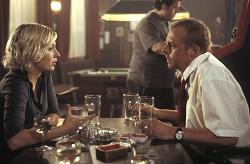 It's not that I don't like Ed...
It's not that I don't like Ed...
The very first scene of the film sets the stage, as well it should, for the film we are about to see--and yet there is no talk of zombies, death, gore, impending doom, or anything else that we might expect from a zombie film. What we have instead is, oddly, a long, multi-voiced meditation on friendship.
The very first exchange of the film, occurring between Shaun and his girlfriend Liz, sets us on this course:
LIZ: Shaun?
SHAUN: Yeah?
LIZ: Do you see what I'm saying?
SHAUN: Yeah, totally.
LIZ: I know he's your best friend, but you do live with him.
Their discussion revolves around Liz being frustrated that Shaun spends more of his time with his best friend Ed than he does with her. She longs for him to leave Ed behind so that she can be the main focus in his life. Shaun defends his friend, but limply, impotently, as though even he's not exactly certain of why he's such good friends with Ed.
This question only grows more difficult to answer when Ed makes the group an offer:
ED: Can I get...any of you cunts...a drink?
In print quite a rude thing to say, and in practice, to be honest, but there's a sincerity in Ed's voice as he asks that makes it clear he really would be happy to get his friends a drink. The vulgarity is a part of his personality, and not symptomatic of anger or irritation. In fact, it may only be symptomatic of the fact that Shaun is probably the only real friend Ed has ever had, and so he's never had to learn the art of social grace.
The art of social grace is something that Liz's friends, David and Di, could also stand to learn, as Shaun in keen to point out. Later in the film we learn that Shaun is as sick of them as Liz is of Ed (he allegedly refers to them as "a failed actress and a twat"), and he discusses his feelings about them politely to Liz.
Why, exactly, Shaun is not keen on David and Di is not yet clear, but it becomes apparent as the film progresses that David suffers from a severe inferiority complex (for which he overcompensates by being very selfish and irritable) and Di has difficulty keeping reality separate from her stage experience.
Sound like a zombie movie at all? It will, very soon, and that's why it's so important to keep these early, pre-zombie scenes of the film in mind, before the distractions set in and you lose sight of what the film is really about.
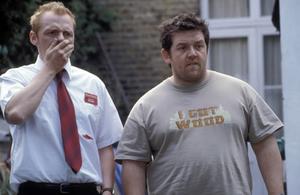 Fuck-a-doodle-doo.
Fuck-a-doodle-doo.
There are two foils to Ed's role as Shaun's best friend, each of them existing as characters so that Ed can be measured against them. David appears first, but does not assume that role until later in the film, meaning that the first character with whom we are to compare Ed is Pete, Shaun's other roommate.
We learn a lot about the friendship dynamic through the way Shaun, Ed and Pete interact, and Pegg and Wright waste no time in blurring the definition of what it really means to be a good friend.
Basically, we can reduce, for the purposes of this argument, both Ed and Pete to several personality traits; Ed is happy, but irresponsible and thoughtless. Pete is frustrated, but responsible and understanding. To see the difference between the two, we need only take a listen to each of their first lines in this scene:
ED: Haven't you got work?
PETE: You do know the front door was open again last night.
Whereas Ed reminds Shaun of his obligation to be at work on time when Shaun threatens to lazily play video games instead, Pete interrupts Shaun in the bathroom to gripe about something that he knows was not Shaun's fault.
Pete accosts Shaun twice that morning--once in the bathroom and once in the kitchen--to harp on about the problems he has with Ed, rather than going to the source of those problems. The result is a torn Shaun, who has to become mediator for the two, and absorb anxiety from both ends. What's important here, though, is that this is Pete's decision to drag Shaun into it, not Ed's.
Shaun explains the unfairness of his position by defending Ed.
SHAUN: I've known him since primary school. I like having him around; he's a laugh.
PETE: Why? Because he can impersonate a monkey? Fuck-a-doodle-doo.
Pete will not allow Shaun to drift and make a decision rooted in sentiment: he brings him back to reality with hard facts.
PETE: Remember that time we stayed up all night drinking apple schnapps and playing Tekken 2?
SHAUN: When was that?
PETE: That was five years ago. When's he going home?
His argument is valid; Ed is not pulling his weight around the house, or even contributing to the income. Shaun takes it upon himself to discuss the situation with Ed, but when he takes too long to get around to the subject, Pete intervenes, and the friendship dynamic is really brought to the fore.
Pete asks Ed to tidy up, to take down telephone messages...a fair enough request on their own, but he is condescending in his speech, implying that Ed might actually be too stupid to handle such simple tasks, and so his request is ignored entirely by Ed.
ED: I ain't doing nothing for him.
SHAUN: Well, do it for me, then.
Shaun is fed up with the situation; he is frustrated and begins to step away from Ed--Pete's irritability almost seems to have rubbed off on him.
Yet Ed will not allow things to end this way.
ED: I'm sorry, Shaun.
SHAUN: It's alright.
ED: No, I'm sorry, Shaun.
The childish fart-joke that Ed plays actually serves a double purpose: much like his "cunts" remark in the pub, the emotion behind what he says is sincere; he really is sorry, but he intermingles it with a fart joke that always makes Shaun laugh, thus also relieving Shaun of the stress that Pete has built up in him this morning and strengthening the bond between he and Ed because of it.
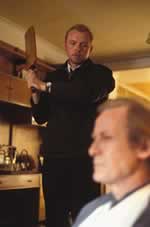 He's not my dad.
He's not my dad.
Before long we meet Philip, Shaun's step-father who, while not a direct foil to Ed, does serve to illustrate a lot of what happens when there is a negative force in the friend dynamic.
His first words to Shaun may be well-deserved, but they are quite far from polite:
PHILIP: I trust you haven't forgotten about tomorrow...your bimonthly visit. Perhaps you can bring the flowers you forgot to bring Barbara on Mother's Day. And not a cheap posey from a garage forecourt.
His demeanor is just short of rudeness, full of that sort of prodding cruelty that can really only be expected of family. Again, somebody intentionally adds to Shaun's daily anxiety, and his lack of concern becomes believable later on when Shaun talks to his mother over the telephone about the zombie invasion.
MUM: They were a bit...bitey.
SHAUN: Mum! Have you been bitten?
MUM: No. But Philip has.
SHAUN: Okay.
ED: Has she been bitten?
SHAUN: No, Philip has.
ED: Oh, okay.
Philip and Barbara (Shaun's mother) have been together for seventeen years by the start of the film, and yet neither of them are able to regard each other as family. Instead, one of them seems to have raised a barrier against the other one, which in turn triggered resentment, and neither of them has ever thought to back down and apologize.
We get the feeling that it may have been Shaun who was originally responsible for the impossibility of bonding.
MUM: You did call him a you-know-what.
SHAUN: What, did he tell you that?
MUM: Yes he did.
SHAUN: Motherfucker!
In fact, both Philip and Barbara seem to have held onto some sort of hope, through all the years, that Shaun might allow Philip into his life. Barbara admits this when her frustration finally gives:
MUM: It's you who doesn't understand; Philip is my husband and has been for the last seventeen years. I know you haven't always seen eye to eye, but I would at least expect you to respect my feelings. You must be more adult about these things.
Even so, having seen his mother reduced to an emotional outburst such as this, Shaun is unable to step up to such maturity, and it is only on the verge of death that Philip can.
PHILIP: You just need motivation, someone to look up to. And I thought it could be me.
It's the first time in almost two decades that either of them have been able to be honest about their feelings, though in many ways it's too late. What happened between them was that both Philip and Shaun had a sense of pride that could not stand to back down when threatened; neither could ever admit to being weak enough to "feel," and so their entire relationship has consisted of bickering and irritation. The friendship dynamic in this case has been stymied by pride, very much, it would seem, as it has in the case of David.
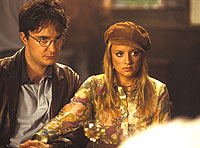 A failed actress and a twat.
A failed actress and a twat.
David and Di are the third main couple in the film (behind Shaun and Liz, and Barbara and Philip), and yet it's very difficult to try to draw parallels or ironic doubling between any of them, tempting as it may be. The reason for this, again, is that romance is not the emotional thrust of the film; friendship is, and when we view these same characters from the standpoint of the friendship dynamic, the comparisons become very rich indeed.
David is Ed's second foil, as it's easy to see the two as perfect opposites. Pete was a foil as well, but there was at least one character trait with which he overlapped with Ed: his respect for Shaun. David has no such quality; his trouble is that he is as insulting as he is logical.
In fact, he delights in insulting Shaun when he's down, an obvious result of the inferiority he feels when compared to Shaun: Shaun has more friends, is happier, and--worst of all--has the love of Liz. When she finally breaks up with him it's as if Shaun is unarmed, and David wastes no time in attacking him.
DAVID: Lizzie doesn't want to see you, Shaun. Go away.
DAVID: Basically I'd say your nine lives were up, Shaun.
It's obvious why Shaun would not get along well with a man so intent on hurting others to make himself feel better, but as to Di, it seems he does not so much dislike her as he dislikes the fact that she comes along in a package with David. In fact, he has very little to say to or about her, which, compared to his obvious disgust with David, is a compliment. He also spares her feelings by claiming he did not call her a "failed actress." He has no such reservations about calling David a twat...which is alright, because it's a label David earns many times over during the course of the film.
Even when their lives are at stake and cooperation is more important than ever, he can not resist a jab at Shaun's misfortune.
YVONNE: This is Shaun, and his girlfriend Liz.
DAVID: They split up, actually.
His rudeness carries over even when he is correct, speaking sharply and rudely when he should be constructive. This does not always mean he should be phrasing things differently as it does mean he should keep his attitude in check. The following exchange exemplifies this perfectly:
DAVID: Do you have any idea where we're actually going?
LIZ: David, come on. (to Shaun) Do you, though?
It's a great moment in the film because of how closely the friendship dynamic is brought to the fore: both David and Liz ask the same question of Shaun, but one of them asks with the desire to make Shaun feel bad, the other with the genuine concern for their safety.
This arises again toward the end of the team's trek toward The Winchester Pub, throughout which David has been the consistent voice of negativity.
DAVID: I trust Shaun has another genius scheme up his sleeve.
LIZ: This is hardly constructive, David.
DAVID: No, Lizzie, this is a waste of time. We should have stayed at the flat.
ED: Yeah, why didn't you?
DAVID: Because...because...because of...Captain Wow.
Even though David has contributed little or nothing to the progress of the team, he still finds it quite easy to criticize and belittle Shaun for what he has achieved, going to far as to blame their hindered progress on him.
In fact, the only time David takes a proactive role in the situation is after Shaun's mother is infected by the zombies...the quintessential moment in which David's logic is spot-on, but his disdain for Shaun overshadows whatever good he might be able to achieve.
Whereas Ed cries with Shaun when his mother dies, David's reaction is to cock the rifle and offer nothing more comforting than, "Move aside; I'm going to count to three." This, bear in mind, is coming from the man who refused to shoot any other zombies on the grounds that he is a pacifist. Now that it's Shaun's mother, however, it's a different story.
SHAUN: That's what this is about, isn't it? It's just...it's just he doesn't like me. He's always hated me and now he wants to shoot my mum.
Shaun may be a bit overemotional about David's solution, but only a bit:
LIZ: I can see what David is trying to say...
DAVID: Thank you, Lizzie.
LIZ: ...even if he is being a twat.
Eventually, though, the job needs to be done, and after Shaun has performed the obviously draining task of shooting his mother, David is quick to revert to his cold self, dismissing the pain Shaun is feeling with a curt, "Well, I think we're all agreed you did the right thing, there."
Just before he bows out of the film, however, David is given a choice, and it's a choice that will separate his brand of derision from Philip's, because on the verge of death, Philip found it in his heart to sacrifice his pride and apologize. Whereas David...
DAVID: I'm so sorry, Diane.
DI: Maybe I'm not the one you should be apologizing to.
DAVID: Shaun...
His moment arrives, and yet he hesitates. He hesitates in a way that Philip did not...each of them understood that death was pressing in on them, and yet David was unable to sacrifice his self-importance for the sake of redeeming himself; this after hearing Shaun recite Bertrand Russell's quote that "the only thing that will redeem mankind is cooperation." He refuses to cooperate, and thereby refuses redemption. David pays the ultimate price for having disregarded the friendship dynamic.
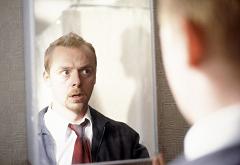 Pete, Part II
Pete, Part II
The distinction between David and Ed is clear enough, but if both Pete and Ed honestly care about Shaun, where exactly is the difference?
It certainly would seem that Pete's friendship with Shaun is more selfish than Ed's--after all, it is Ed who takes him out for the night and offers to keep him company until he feels better about the breakup with Liz.
ED: Fuck her. You got your pint, you got your pig snacks. What more do you want?
Ed listens to Shaun vent in the pub, he even lets Shaun get away with crying, proving that Ed can actually be a good friend when the opportunity arises.
In fact, it may well be the case that Ed is there to demonstrate that there is a very big difference between being a good person and being a good friend. Pete is a good person in that he is responsible and level-headed, but it is Ed who sacrifices his time to be with Shaun when he really needs it. Pete, on the other hand, refuses to bend, breaking up the celebration in the apartment just as Shaun is beginning to feel better.
He explains that he is on edge, that he has to get up for work soon, that most of his coworkers are home ill, that he was bitten by a mugger earlier on.
PETE: Can you see why I'm so fucking angry?
ED: Fuck yeah!
Ed's attempt at sympathy, however, is interpreted by Pete as mocking, and he readies himself for a fist-fight. Shaun breaks it up, explaining that they are all friends.
PETE: He's not my friend; he's a fucking idiot.
Pete then goes on to explain why Shaun's friendship with Ed might be his biggest obstacle at all, though in a rude enough way that even David might be proud of him.
PETE: Stop defending him, Shaun, he's holding you back. Or does it make your life easier having someone around who's more of a loser than you are? [...] I assume it was Liz who did the dumping? Sort your fucking life out, mate.
Shaun, then, is right back where he started: depressed, feeling worthless. Everything Ed has done for him, cheering him up at the pub, singing on the way home, dancing in the flat, has been undone.
It's interesting to note that when Shaun, later that night, staggers into the kitchen to make a list of things to do, all three of them were suggested, rudely, by those characters who violated the friendship dynamic and thus made such a negative impression on Shaun that it bothered him even deep into his slumber.
The first entry, "Go round Mum's," was suggested by Philip, the second, "Get Liz back," by David, and the third, "Sort life out," by Pete. It would seem from this that aggression, rather than friendship, is the way to make an impact, but, through cinematic karma, none of these characters will make it safely to the other side of the film. Only Ed will, buoyed by friendship, and not by self-importance.
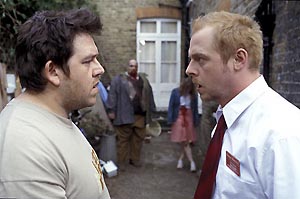 Pow! Supermum!
Pow! Supermum!
So who does come through at the end of the film? One by one Shaun's team is reduced owing, mainly, to bad decisions on his own part. This is where the theme of the film really shines, because Shaun has to face the fact that he has done this himself, that he has brought his friends into misery, into danger, and, ultimately, into death.
SHAUN: I just...I couldn't save us. I couldn't save Di or David, I couldn't even save my mum. I'm useless.
The exaggerated parable of friendship has given us a situation in which Shaun has wronged, in some way, every character in the film, even, in many cases, being responsible for their deaths, which, it can easily be argued, is the worst thing you can ever do to a friend.
However, it can also be seen as Shaun being deserted, one by one, by these people. He may bring them to their deaths, but, in Shaun of the Dead at least, there is something on the other side of death, a state of zombiehood that is not, in fact, entirely removed from the way in which somebody lived. The kid with the football still kicks it around after death, Pete still holds on to his distaste for Ed (and even takes the opportunity to attack him), newspeople drone on about zombies retaining "their primal instincts." What this means is that death is not the end...the characters are given one more chance to reconnect.
Barbara takes that chance to reconnect with her son, as it's clear she recognizes Shaun after she becomes a zombie, and refuses to hurt him. In fact, she does not so much as threaten anybody until David shouts at Shaun to "do it," which causes her to lash out at him, her son's enemy. This extension of motherly protection results in her being shot, and she has sacrificed herself for her son.
This can be expected of his mother, but what of his friends? In fact, Barbara's death scene is moving and is certainly given appropriate gravitas, but it does not compare to the later scene of Ed's passing. Perhaps it's because the loss of a parent is something most people expect to experience in a lifetime; it doesn't make it any easier to accept, but at least it's a part of the natural scheme of things. Losing a best friend, on the other hand, cannot be predicted, and coming as it does on the heels of Shaun being deserted by everybody he cares about in one day, it becomes very difficult to swallow indeed.
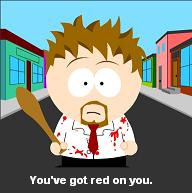 "You're My Best Friend"
"You're My Best Friend"
By the end of the film, only two characters remain by Shaun's side: Liz and Ed. Ed is one whom Shaun has allowed to die through misjudgments and bad decisions on his own part, and yet, even after death, even after he has been wronged and lambasted by Shaun all through the movie, even after his friend has let him down in the worst way imaginable, he returns, after death, in a true demonstration of what it means to be a friend.
The same cannot exactly be said of Liz, as Shaun's list of transgressions against her consists mainly of crimes of thoughtlessness and insensitivity. She has stayed with him because their relationship always had the chance to work if he could take her best interests to heart rather than his own, and so the result is less remarkable than it is refreshing.
Ed, however, goes so far as to return from death to stay with Shaun, demonstrating once and for all a kind of forgiveness (and self-awareness) that no other character in the film was capable of.
This is not something that came easily to either of them; it was born of a long day of difficult lessons.
SHAUN: Come on, we're getting out of here.
ED: I might as well just stay here.
SHAUN: Yeah, but we can get out.
ED: I think you two should make a go of it. I'll only hold you back.
Ed finally understands what it was that made Pete despise him so, and why exactly Shaun would get frustrated and lash out at him during the film. But it's not only Ed who has learned something about the friendship dynamic by this point; Shaun also apologizes as he leaves his friend behind, aware, entirely, that he has been the cause of this tragedy.
And yet Ed returns, to stand by his friend. And it may be as a drooling zombie, but it's a drooling zombie who now understands the real meaning of friendship. The two spend their time playing video games and being lazy, just as they had before.
By no means the smartest character in the film, nor the bravest, nor the strongest, nor the most honest, nor the most understanding, Ed is the only one who will defy all barriers, including the barrier between life and death, to be with Shaun. And though at the end of the film neither of them are any better at expressing their feelings, the appropriate song swells up, and speaks for them both: "You're My Best Friend."
About this entry
- By Phil Reed
- Posted on Saturday, May 19 2007 @ 3:21 pm
- Categorised in Film, Analysis
- Tagged with nick frost, simon pegg, edgar wright, shaun of the dead
- 7 comments

What I like about SotD is that no-one expects it to be as good as it is. You think it's just gonna be a parody and nothing more but, as you said here Philip, the zombie stuff is just the trimmings, it's not the main focus. That's where loads of films go wrong. You can't beat real characterisation. Shaun and Ed are very real characters.
By performingmonkey
May 19, 2007 @ 5:18 pm
reply / #
Smashing article! Pretty much sums up what makes SOTD a fair bit better than Hot Fuzz in my opinion- how much there is going on beneath the surface.
By Michael Lacey
May 19, 2007 @ 7:30 pm
reply / #
By the way, the 'cunts' line is probably the best use of that word in anything ever (yes, even beating that Rob Grant headline...).
By performingmonkey
May 20, 2007 @ 1:05 am
reply / #
>the zombie stuff is just the trimmings, it's not the main focus. That's where loads of films go wrong.
Absolutely. It would have been so easy for Shaun of the Dead to have just been a load of zombie jokes and that's that. And you know what? It still probably would have made money. Why not? I bet it would have been funny enough. But would people still be talking about it years later?
I doubt it. At least not with this much fondness. Like Spaced, it went further than it strictly had to go. As long as they had the chance to make the zombie movie they always wanted to make, they invested a good deal of emotion, great acting, touching scenes...all the stuff that makes movies GOOD. And they actually DID it. They didn't just try and fail...which would have been, let's face it, very embarrassing.
>Pretty much sums up what makes SOTD a fair bit better than Hot Fuzz in my opinion- how much there is going on beneath the surface.
I don't disagree with that. Hot Fuzz was great...and the characters were still better than they had to be...but I think Shaun is much deeper than Angel. Of course, as someone mentioned in another post here, it'll take a few years and many repeated viewings for a judgment like that to really carry any weight.
Still, I do think Shaun stands beside my other favorite "character movies" (like The Royal Tenenbaums, Glengarry Glen Ross, Ghost World) in a way that I'm not sure Hot Fuzz ever well. Again, it's still a great film...but compared to this, it's almost necessary to qualify that.
By Philip J Reed, VSc
May 20, 2007 @ 2:12 am
reply / #
Firstly; More of This Sort of Thing Please.
Don't think that's been said enough yet, but after catching up on the wonderful Futurama doodah as well, it needed at least one more airing.
I only have the comic to hand (a rather curious thing, that comic) and you've only gone and made me want to watch it again. I imagine when I do I'll have something more constructive to add to this discussion.
By Rosti
May 29, 2007 @ 11:42 pm
reply / #
Yeah, get your Partridge article posted, Phil ;-)
By Seb
May 30, 2007 @ 12:08 am
reply / #
>More of This Sort of Thing Please.
Ahhhh I'd love to. I really need to batten down and get this stuff written. I already have formulated, in my mind, a full character analysis of a certain League of Gentlemen favorite and an explorative essay on one particular episode of Black Books...but it all comes down to time...and motivation. I think I need to set aside one night every month or so and just convince myself that this stuff needs to be written.
>Yeah, get your Partridge article posted, Phil ;-)
Will do. Actually, I'd better get a move on that, before my site goes offline and I lose this stuff.
By Philip J Reed, VSc
May 30, 2007 @ 12:29 am
reply / #